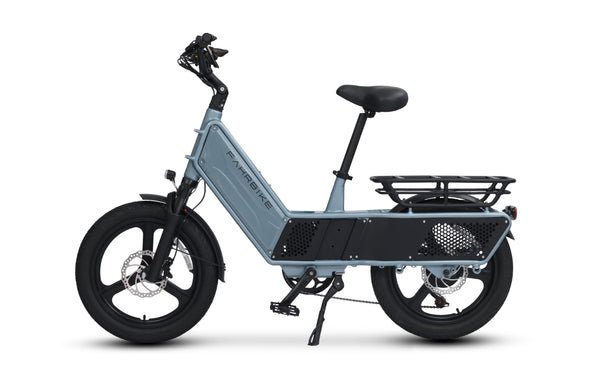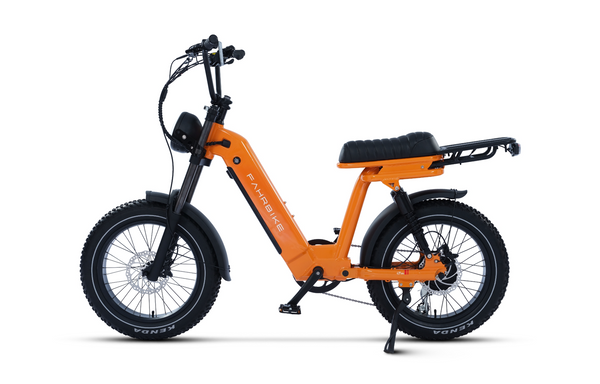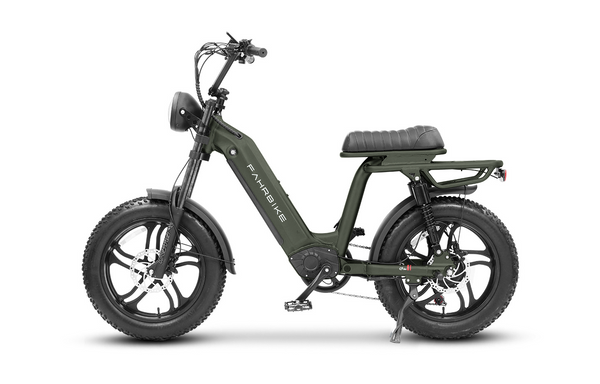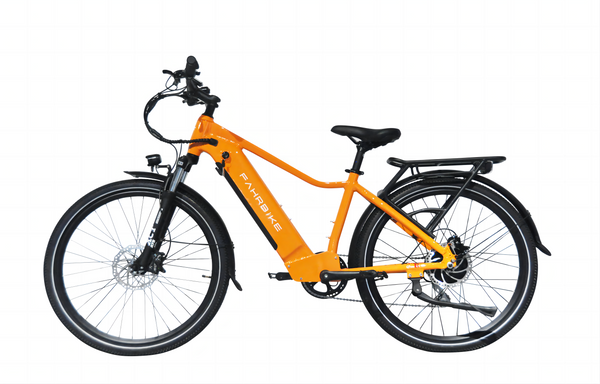
In recent years, electric bikes (e-bikes) have gained significant popularity as a convenient and environmentally friendly mode of transportation. With advancements in technology, commuter e-bikes have become more affordable and practical for everyday use. Whether you're a city dweller looking for a greener way to commute or someone who enjoys recreational biking, investing in a commuter e-bike may seem like an enticing option. However, like any investment, it's essential to weigh the pros and cons before making a decision. In this article, we'll delve into the pros and cons of commuter e-bikes to help you determine if it's worth the investment for you.
Pros of Commuter E-Bikes:
-
Eco-Friendly Transportation: One of the most significant advantages of e-bikes is their eco-friendly nature. As they are powered by electric motors, they produce zero emissions, reducing your carbon footprint and contributing to a cleaner environment. By choosing an e-bike over a traditional vehicle, you're actively participating in the fight against climate change.
-
Cost Savings: Commuting by car or public transportation can be expensive, with rising fuel costs and fares. In comparison, e-bikes are incredibly cost-effective. The cost of electricity required to charge an e-bike battery is significantly lower than the expenses associated with gasoline or public transportation fares. Additionally, e-bikes have fewer maintenance needs and lower insurance costs than cars, allowing you to save money in the long run.
-
Health and Fitness Benefits: Although e-bikes offer electric assistance, they still require physical effort to operate. Commuting with an e-bike allows you to incorporate exercise into your daily routine. You can choose the level of assistance you need, allowing you to gradually increase your fitness level. Regular physical activity has numerous health benefits, including improved cardiovascular health, increased muscle strength, and reduced stress levels.
-
Convenience and Flexibility: Commuter e-bikes provide the convenience of traveling at your own pace and avoiding traffic congestion. With e-bikes, you can bypass traffic jams, take shortcuts through bike lanes, and easily find parking spaces. E-bikes also offer more flexibility in terms of route selection, allowing you to explore alternative paths and enjoy scenic routes that might not be accessible by car.
-
Accessibility and Inclusivity: E-bikes make cycling accessible to a wider range of individuals. For people with physical limitations or health conditions that might hinder their ability to ride a traditional bike, e-bikes offer the opportunity to enjoy cycling with the assistance of the electric motor. This inclusivity allows more people to experience the joys of biking and reap its benefits.
Cons of Commuter E-Bikes:
-
High Initial Cost: While e-bikes provide long-term cost savings, they do require a significant upfront investment. The price of a quality e-bike can range from a few hundred to several thousand dollars, depending on the brand, features, and battery capacity. For some, the initial cost may be a barrier to entry, requiring careful consideration of the long-term financial benefits.
-
Limited Range and Battery Life: One of the limitations of e-bikes is their range and battery life. Depending on the battery capacity and the level of assistance used, e-bikes typically have a range of around 20-50 miles per charge. This range can vary based on factors such as terrain, rider weight, and weather conditions. If you have a long daily commute or plan on using the e-bike for extended trips, you may need to consider the availability of charging stations or carry an extra battery.
-
Weight and Handling: Commuter e-bikes are generally heavier than traditional bicycles due to the electric motor and battery. This additional weight can make maneuvering and handling the e-bike more challenging, especially when navigating tight turns or carrying it up stairs or onto public transportation. It's important to consider your physical strength and mobility when opting for a commuter e-bike, as the added weight may pose limitations in certain situations.
-
Maintenance and Repairs: While e-bikes generally require less maintenance than cars, they still require regular upkeep. The electric components, such as the motor and battery, may require occasional servicing or replacement, which can add to the overall cost of owning an e-bike. Additionally, finding specialized repair shops or technicians to handle e-bike repairs may be more challenging than finding traditional bike repair services.
-
Theft and Security: E-bikes, especially higher-end models, are attractive targets for thieves due to their value. Despite the availability of locks and security features, there's still a risk of theft. It's crucial to invest in quality locks, store your e-bike securely, and consider insurance coverage to protect your investment. Being cautious and proactive with security measures can mitigate the risk, but it's an aspect that should be considered.
-
Infrastructure and Regulatory Factors: The infrastructure for cycling, including bike lanes, charging stations, and bike-friendly facilities, may still be limited in some areas. Before investing in a commuter e-bike, it's essential to evaluate the cycling infrastructure in your location and consider if it aligns with your commuting needs. Additionally, regulations and laws regarding e-bikes can vary between jurisdictions, so it's crucial to familiarize yourself with local laws and restrictions before using an e-bike for commuting.
Is It Worth the Investment?
Determining whether investing in a commuter e-bike is worth it depends on your individual circumstances, preferences, and priorities. If you prioritize eco-friendliness, cost savings, and health benefits, an e-bike may be a worthwhile investment. It offers a greener and cost-effective mode of transportation while providing exercise and flexibility in commuting.
However, if the initial cost, limited range, and potential maintenance and handling challenges are significant concerns for you, it may be worth exploring other transportation options or considering alternative types of bicycles that better suit your needs.
To make an informed decision, it's recommended to test ride different e-bike models, consider your daily commute distance, evaluate the availability of charging infrastructure, and assess your comfort level with the weight and handling of an e-bike. Additionally, researching local regulations and considering theft prevention measures can further inform your decision.
Ultimately, the decision to invest in a commuter e-bike rests on your personal circumstances and priorities. By weighing the pros and cons, you can make an educated choice that aligns with your lifestyle, budget, and transportation needs.
-





